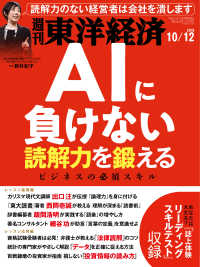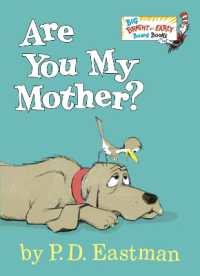- ホーム
- > 洋書
- > 英文書
- > Politics / International Relations
Full Description
The Iraq War of March 19, 2003 was an implausible war at the outset. We now understand that it could have been averted and never should have been waged. How and why did it begin? Who was responsible? This book offers a new perspective on the Iraq War and explains the dynamic relationships between the George W. Bush administration, the United States Congress, and the national news media. It is based on the "multiple streams model of political change" by John Kingdon, which says that if a unique combination of political, policy, and problem streams collide, under the right circumstances, they can create a window of opportunity for a shift in policy. It was the terrorist attacks of September 11, 2001, which set the stage for the emergence of three dynamic streams in the country. Fear, power, and a contentious political climate converged to produce not only a dramatic new foreign policy, but also a war with Iraq, a country which had not provoked or threatened the United States. Fear, power, and a tense political climate also influenced institutional behavior and exposed the failures of 1) The executive branch in the administration of George W. Bush, 2) The United States Congress and, 3) the national news media. All are designed and are differently responsible to protect the interests of the American people.
Errors in judgment have happened throughout history with other administrations, with other Congresses, and with the news media. However, with regard to the Iraq War, it was a matter of degree and extent, especially for the President of the United States. Both the Congress and the news media were also experiencing colossal institutional changes, which influenced and hindered their performances. However, all were culpable in helping to create the Iraq war, which today stands as one of the longest military conflicts in United States history.
Contents
Prologue
Introduction
Chapter 1: The Fear Factor: How It Shaped Political Decisions and Policy
Chapter 2: The George W. Bush Administration: The Case for War with Iraq
Chapter 3: The United States Congress and Iraq: Checks, Balance and Oversight
Chapter 4: The News Media: Reporting and the Run-Up to War
Chapter 5: The Iraq War: Reflections, Repercussions & Resolution
Bibliography








